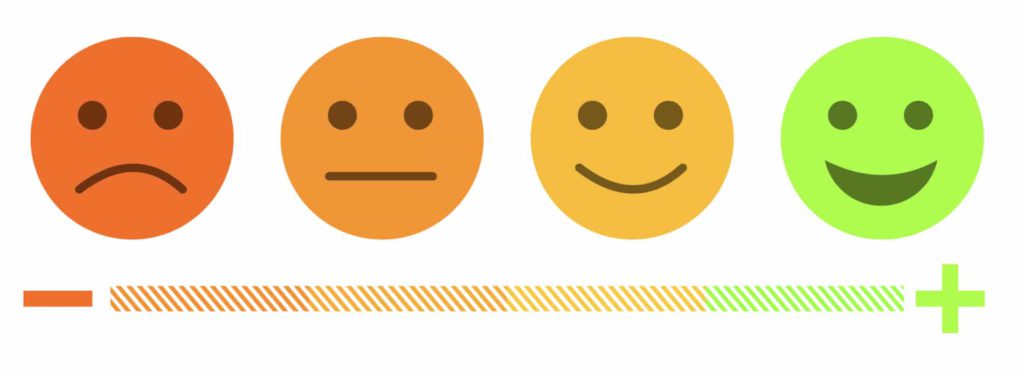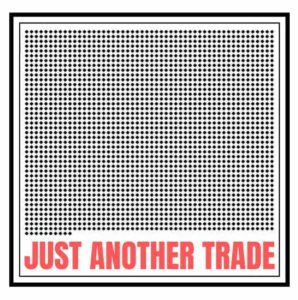In my opinion, not all profitable traders are also successful traders. You can certainly be a profitable trader without being a good, successful trader. For instance, if you always risk all your capital on every trade, you might be profitable for a while, but you certainly wouldn’t be a good trader. Enough time, however, will separate the profitable traders from the truly good and successful ones.
In this article, you will learn what distinguishes a successful trader from an unsuccessful trader. The focus of this post will be on the mindset and attitude instead of on specific trading techniques. From talking to, hearing from and reading about countless successful traders, I found that the main differentiator between a successful and an unsuccessful trader is their mindset.
1. Emotional Control
I’d say that probably the most important trait of a successful trader is their ability to control their emotions even in the most intense situations. If you are severely impacted by every win and loss from your trades, you will have a very emotionally turbulent life.

Most successful traders don’t allow the outcomes of individual trades to really affect their emotional state. Emotional control also includes the ability to admit being wrong. If you take every trade personally, you will always try to battle your losing trades so that you aren’t proven wrong.
Successful traders don’t have a problem with taking a loss and thereby admit that their initial hypothesis wasn’t correct. One reason why this is so easy for successful traders is that for them a loss is not the same thing as a failure. So many people automatically assume that a losing trade is a bad trade. But just because a trade didn’t work out, doesn’t mean that it wasn’t a good trade.
For instance, if a certain type of trade works 9 times out of 10, you shouldn’t see the one losing trade as a bad trade. As long as you take the loss and thereby manage the risk, it was a good trade. But if you start to fight the trade and let the loss get out of hand, it becomes a bad trade.
In other words, do not judge your trades purely based on their outcome. Don’t fall prey to the hindsight bias and think about what could’ve, should’ve, would’ve happened if you only would have done this or that. Instead, evaluate your trades based on what actually happened, how well you executed your plan, the trades’ odds, and their potential.
Furthermore, successful traders know what they are doing and they are aware of this. Therefore, they don’t constantly hesitate, rationalize and question themselves. Instead, they allow themselves to focus and take good trades without wasting time on rationalization.
Note, however, that this requires actually knowing what you are doing. If you are just starting out or have no experience, you should not think that you know what you are doing! Don’t become overconfident.
Summed up, successful traders have strong emotional control which includes:
- The ability to admit being wrong
- The ability to change their minds
- The ability to take losses without hesitating
- The ability to fully focus
2. Treating Trading like a Business

Another key trait of successful traders is their approach to trading. Successful traders approach trading in a very professional manner. They don’t treat it like a small fun hobby. Instead, they treat their trading like an actual business. If you fully accept your trading to be a serious business, you start to become more aware of your actions in terms of their impact on your business. You become more aware of the risks and consequences of every trade. Every decision you make becomes a business decision that could either harm or help the future potential of your business.
Someone who treats his trading as a fun little side hobby is far more likely to risk too much money on a trade with bad odds than someone who treats their trading like a business.
3. Versatility
A further important trait of successful traders is their versatility. Versatility allows you to quickly change your opinion about a certain trade. This is very important because market conditions constantly change. There is nothing worse than a stubborn trader who has made up his mind about where the market is heading and is unwilling to change his hypothesis in spite of plenty of evidence to the contrary. This is usually how traders blow up.
With being versatile, I don’t only mean being able to change your opinion mid-trade. I also mean being versatile over longer time frames. Markets change over time and thus, certain strategies might start or stop working. Therefore, you must be able to adapt your entire trading approach if there is enough data to support a strategy change.
4. Leaving Your Ego Outside
Next up, let’s talk about ego. Ego and trading do not belong together and successful traders are very aware of this. If you start connecting your ego to your trading, you are already doomed to fail.
One of the biggest mistakes, unsuccessful traders make is connecting the outcome of their trades to their personal self-worth. The outcome of a trade might have an impact on your net worth, but it should never impact your self-worth.

If you start connecting your ego with your trades, you will automatically start thinking of losing trades as personal failures that question your self-worth. And if you start interpreting trading losses as personal attacks, you will do everything to shift the blame, because your ego won’t allow you to admit being wrong. This puts you in very dangerous territory because if you don’t think that you’re in control, then you won’t think that your actions have any real effect on the outcome of your trades. This thought process will lead to very bad trading habits which, in turn, will likely lead to you blowing up.
So do not put your ego in the way. Do not take trades personally and always remember, you are in full control of your actions. Never blame anyone or anything else for your mistakes and your trades. Be real with yourself! You might be able to fool yourself, but you won’t be able to fool the market for a very long time.
A great book on the role of your ego in trading and in life, in general, is “Ego Is The Enemy” by Ryan Holiday.
Check out “Ego Is The Enemy” on Amazon
(This is an Amazon affiliate link which means I receive a small compensation from sales through this link.)
5. Developing Your Own Style
One more critical characteristic of successful traders is their personalized trading style. Successful traders know that there are countless ways to make money trading the markets. However, they also know that only a fraction of these ways will work for them. Every successful trader that I have ever talked with, heard of or read about has their own personalized way of trading the markets.
It is crucial that you find a trading style that fits you! Everyone has their own strengths and weaknesses and therefore not everyone should be trading the same strategy. You need a strategy that takes advantage of your personal strengths and avoids your weaknesses.
There are endless trading strategies that have the potential to be very profitable. But only a few of them will be a good match with your personality and preferred trading style.
Note that with a personalized trading style, I don’t necessarily mean that you have to have a completely original, new, self-developed trading approach. Not everything about your strategy has to be unique. It can very well be a well known, commonly used strategy. But you should at least add some kind of personal twist to it.
From experience, I can say that even if 10 people set out to trade the exact same overall strategy, they will all trade this strategy in their own (slightly) different way.
If you don’t yet know what your strengths and weaknesses are, in terms of trading skills, don’t worry. It takes time and experience to find this out. One great way to learn about your trading personality is by doing some kind of experimental trading period. During this time, you trade with a very low amount of money and try as many different strategies, techniques, styles as you can. While you test all these trading styles, you track your financial and emotional performance.
By doing this, you can find out what you are good at, what you aren’t that good at, what you like, what you don’t like and much more. Having this data should give you an idea about what kind of trader you should try to become. For instance, if you are terrible with very short-term day trades because you need more time to think, feel very stressed and prefer looking at the bigger picture, you should certainly not go into day trading. Instead, you could look at becoming a longer-term swing trader or even get into investing.
6. Seeing the Big Picture

Another important trait of successful traders is the ability to see the big picture. With the big picture, I am not talking about the overall economic situation. Instead, I am talking about the ability to look at your trading career on a more zoomed out level. If you do this, you have a much better perspective to evaluate yourself and your trades.
For instance, if you look at your next trade as one out of thousands of future trades, you won’t be very emotionally attached to the outcome of that trade because it is just another trade. Furthermore, you will think about how you can make this trade without severely impairing your ability to make those future trades. This leads you to manage your risk much better.
Think of your trades as single data points on a huge statistic.
Don’t go for a home run on every single trade. Instead, make thousands of small favorable trades. The profits will add up over time. Here are some reasons why many small bets are superior to trying to hit home runs:
- Many small bets, means low risk on a per-trade basis. This is much easier to handle emotionally than if every trade could either make or break you.
- Your overall trading performance will be much more stable and predictable which also helps with your emotional control.
- Your odds won’t differ significantly from trade to trade. Therefore, it makes much more sense to have a relatively low and small range for position sizes than to sometimes risk huge amounts on certain trades.
- Many small wins slowly build trading experience and confidence which will help you make better trades going forward.
7. Having a ‘Student Mentality’
Last but not least, successful traders are very open-minded and always approach trading with a so-called student mentality. Having a student mentality means that you are aware of the fact that you don’t know everything and you are willing to learn.
Successful traders don’t only try to learn from other successful traders. They try to learn from their own trades, their mistakes, their successes and everything that might help them further develop their trading abilities. This is also why almost every successful trader tracks their trades in a very in-depth manner. Having actual data on your trades is one of the best ways to grow as a trader.
“It is impossible for a man to learn what he thinks he already knows.”
Epictetus, Discourses, Book II, ch. 17
If you think, you already know everything, there is nothing for you to learn and thus, you won’t have any room for improvement. Therefore, you will always be stuck at your current level of trading performance. So do yourself the favor and always be open to feedback. Always look at your own trades with a critical eye.
If you don’t know how to get started tracking your own trades and analyzing your trading data, I highly recommend my guide on tracking your trades:
Check out my Ultimate Guide to Tracking your Trades
Conclusion
I hope these 7 traits of successful traders could give you some idea for what aspects of your trading mentality you could work on. I know that these seven traits depict a close-to ideal trading mentality. I am well aware that it is very hard to implement all of these characteristics into your own trading. Therefore, I recommend thinking of these traits as ideals to strive after, instead of personality traits that you have or don’t have.
Here is a short recap of some of the most important traits of successful traders:
- Emotional control
- Treating trading like a business
- Being versatile
- Keeping your ego out of trading
- Developing your own trading style
- The ability to see the big picture
- Having a student mentality
I really hope you enjoyed reading this article about 7 traits of successful traders. If you have any questions or comments, make sure to let me know in the comment section below!


A great article, and I think you’ve nailed the traits of being successful in any area of life where you succeed or fail based on your own actions, especially anything relating to making money or running your own business. People reacting emotionally in the workplace to business situations was one of the things that drove me out of the 9 to 5 and to set up on my own. Being able to step back, take a deep breath and see the big picture plus being willing to say “what can I learn from this?” are key not just to your own success but to the emotional well-being of all concerned. Thanks for sharing.
Hi,
Thanks so much for sharing your insights. I totally agree with you!
Hi Louis
Those are 7 of the most important traits that anybody should have, no matter if your are a trader or a businessman, or even human being. We all must be willing to learn, to adapt, to be cool and collected and more important to be analytical. I also think you need to have nerve of steel, not to give up when everything is going wrong.
One of the best advice I was given is when the market is crashing, you should be happy, as this is the best time to invest.
I think if you have all 7 traits you will be a great trader.
Thanks
Antonio
Hi Antonio,
Thanks so much for your comment. I am very happy to see that you agree with this list of important traits to have.
Trading is a very complex operation, and we need to have a close concentration on what is happening,what we are trying to achieve,and what other traders are doing,to make a successful move or trade.
As has been said we need to leave our emotions out of our trading,and keep a professional,and cool attitude,no matter, if we have made an error, or if we have made a very successful move,we mustn’t second guess our self,or try to rationalize what we have done, but just to move on to the next trade.
We must always have,a learning attitude,and must never think that we know it all,we all have a lot to learn in making trades,and we need to watch the more experienced traders,and learn from their moves and method of trading,so that we can incorporate it into our own strategy,and thereby become more successful.
We need to be versatile in doing business, we need to watch the market,and be able to change our strategy,as the market changes,so we need to modify our approach,to doing the deal.
There is a need for us to be able to step back occasionally,and take a look at the bigger picture,to see where the market is moving,and to be able to modify our strategy, and the steps we need to take,to make more successful our trading.
Hi Robert,
Thanks for summing up these traits. The only thing I would add is that you shouldn’t only watch and learn from more experienced traders. You should also try to learn as much as you can from your own trading.
This post on 7 traits of successful traders are very relevant and in touch to my heart as I have been trading for years.
I do admit that trading naturally doesn’t come easy for me especially the part on having good emotional control.
In the past , I was too egolistic to understand and learn from my mistakes and keep repeating my old mistakes due to lack of emotional control.
I am better now as I learnt the art of letting go and stop being too hard on myself for my mistakes.
Being versatile is very important as a trader as we constantly need to understand what works and what doesnt work for us.
Thanks for this great comment. I too, have been struggling with some of these traits before. Actually, I think most traders have at some point.